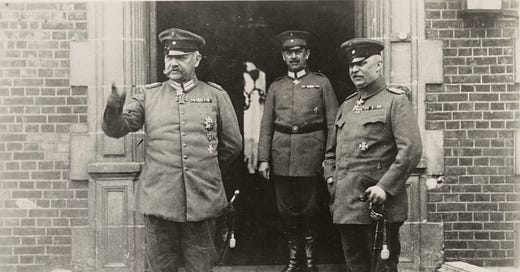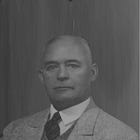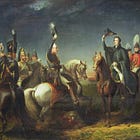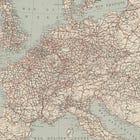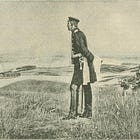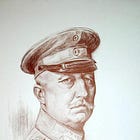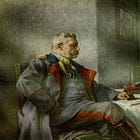In the issue of that magazine dated April, 1939 Wissen und Wehr (Knowledge and Defense) published a substantial reply to the three articles articles that Georg Wetzell had written in response to the introduction that Wolfgang Foerster wrote for his book Heerführer des Weltkrieges (Military Commanders of the World War.) The sub-series continued with this post presents a translation of this article made by Frederick W. Morton in 1939 and revised, with reference to the German original, by Your Humble Servant.
For the first five posts in this sub-series, please see …
For links to translations of the articles written by General Wetzell and, when they appear, the other parts of Lieutenant Colonel Foerster’s article, please see
Wolfgang Foerster
The Picture of the Modern Military Commander:
A Word of Defense and Explanation
(Continued)
What about the objections to this brief sketch? First of all, the ‘solitary military commander’. I refer to a statement of Ludendorff himself, who in The Total War writes:1
The military commander stands alone. He is a solitary figure. No one can penetrate his thoughts, no matter how clever and intelligent the members of his staff may be. That is precisely what I mean when I say:
The military commander should utilize the advice of others. There are enough intelligent minds who can help him to survey the entire breadth of the field of vision. However, this does not mean that he is a weakling, prone to indecision, who needs external support. Rather, the military commander takes pride in taking full responsibility for his decisions. Next, the ‘military commander who is a stranger at the front’. I spoke of a ‘separation if not estrangement of the troops and the commander in chief’. Can it really be argued that the troops in action did not see the strategist of the World War, that they did not know him personally, but knew him only from hearsay?
The profound and direct mutual relationship which in olden days united the military commander and his implement was absent during the World War. As a matter of fact, it could not exist. (I wish to emphasize that, throughout my discussion, I have in mind only the commander-in-chief of all forces, and not the commanders, senior or subordinated, who serve under to him.) It would be a gross misinterpretation of my thought to conclude from it that the modern commander-in-chief cannot maintain spiritual contact with the troops, exercise a mental influence upon them, and look after their welfare.
Even though the military commander has become invisible to the troops, a solitary figure who, ‘in his heart remains close to his troops’, to quote from my article. Now as ever, Ludendorff says, ‘the will to victory must radiate from him, and penetrate the army and the nation, and lead them to heroic deeds’.
The ethos of this thought is expressed by Prince Frederic Carl, one of our foremost military teachers and builders of troops, by placing onto the lips of the soldier the enthusiastic question addressed to his leader on the day of battle: ‘Sire, where do you command that we shall die?’ The ethos of that thought will hold true for all times to come.
Yet the ways and means used by the commander to influence the troops on the front have changed due to the separation of troops and commander.
The Learned Military Commander
The mental effort of the military commander certainly has nothing in common with ‘erudition’, that applies today as ever. To be sure, education and knowledge have always been an essential prerequisite for ability. I wrote:
Our knowledge of Frederick the Great, Napoleon, and Moltke shows clearly how eager they were in the pursuit of knowledge, yet how even more keenly they felt the need of utilizing the knowledge to train their minds and convert knowledge into judgement. However, no intuitive appreciation, no calculation - however highly the two may be valued - can bring about the decision which constitutes the real task of the commander-in-chief. The source of the true decision, which must be firm and resistant, yet pliable, consists in his self-reliance and the faith in his own ability. That bans ‘learnedness’ from the intellectual workshop of the military commander.
In specialized fields, where the work is well-nigh of a scientific character - such as technology, chemical warfare, meteorological service, and others - the military commander relies upon the advice of the expert. For, as Ludendorff explains,
the military commander must not permit technical details to obstruct the wide scope of his thoughts. Finally, however, the individual results produced by the council of highly trained specialists must be concentrated in the mind of one man, where they must form a harmonious entity.The Thinker at his Desk
While there is no denying that a large extent of the mental activities of the modern military commander revolve around his desk, I do not mean to say that all of his time is spent at his headquarters. That the military commander of the World War could not rely exclusively upon technical means of communication in order to make his authority felt in all places, goes without saying and requires no comment. Quite frequently he had to resort to personal discussions with the representatives of allied high commands and subordinate commanders, which meant repeated absences from his headquarters. That held true in the case of both Falkenhayn and Ludendorff - though unfortunately not of the younger Moltke.
Yet this essential mobility of the military commander does not alter the fact that he made his decision ‘in a warm and well illuminated room at the map table’ and not in the terrain or on the battlefield. Tannenberg was the only battle which Hindenburg and Ludendorff did not direct solely from their headquarters. Nevertheless, even in that case, it was the map rather than observation on the ground which furnished the bases for the few decisions and directives not issued from the headquarters (of the Eighth Army).
From the latter part of the autumn of 1914 to his assumption of the High Command in August 1916, Ludendorff directed the operations on the Eastern Front from Posen (Posnan), Lötzen (Giżycko), and Kovno (Kaunas), that is, from places located far behind the front line. Eventually, the High Command was established (on the Western Front) at Pless, Kreuznach, and Spa.
Nor can Avesnes, the seat of G.H.Q. chosen for the offensive of 1918, be termed a place which permitted the commander to gain ‘personal knowledge of the probable zone of operations’. Even his well-known tour of the front, prior to the great drive on the Western Front, did not take him to the troops in the field at all or only in passing through. On the contrary, he visited the offices of the various staffs.
In his proposal of how the initial operations on the Western Front should have been conducted ‘in order to reach a definite decision within eight days’, Wetzell would have the German commander in chief rush around for several days on visits to his various subordinate commanders. Yet, according to his own suggestion, this exchange of opinions and issue of directives can only take place with the headquarters where the staffs are located. It goes without saying, and in no wise contradicts the sense and wording of my statements, that these headquarters do not forever remain in the same location, but are changed as the commander in chief shifts the main effort of his operations.
I do not think that I went too far in stating that the commander of the World War period was ‘confined to his office almost constantly’. To be sure, the modern military commander should take advantage of every opportunity to rest and relax that presents itself. (Ludendorff failed to observe this rule and sacrificed his health.) However, in comparison with the times of Frederic the Great and Moltke, in the future such opportunities will remain rare and fleeting.
To be continued …
For links other parts of this series, please see:
In 1939, Fred W. Merton translated the title of Erich Ludendorff’s Der Totale Krieg (Munich: Ludendorffs Verlag, 1935) as Totalitarian War. In 1936, an organization called Friends of Europe published an abridged translation of this work as The Total War. (All links will take you to the Internet Archive.)


